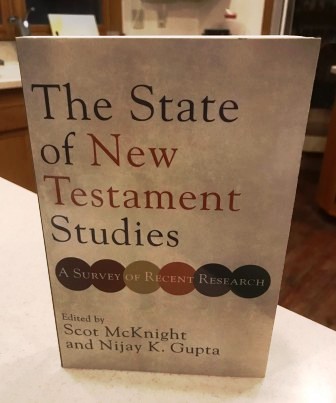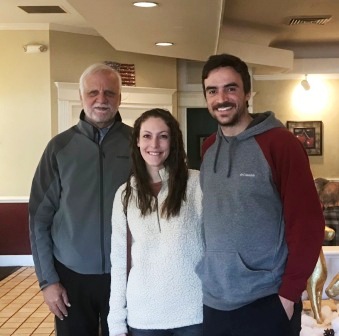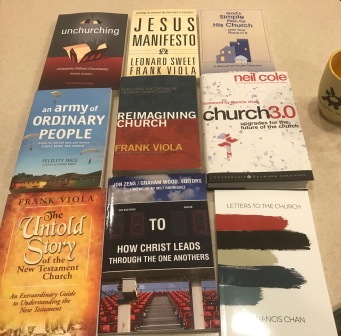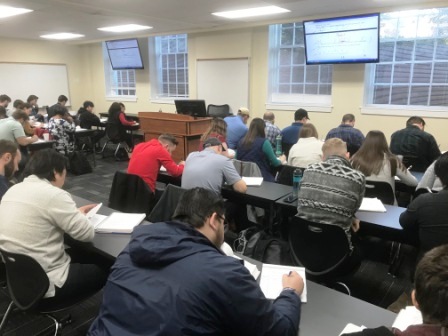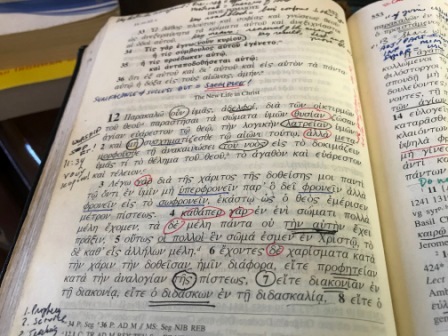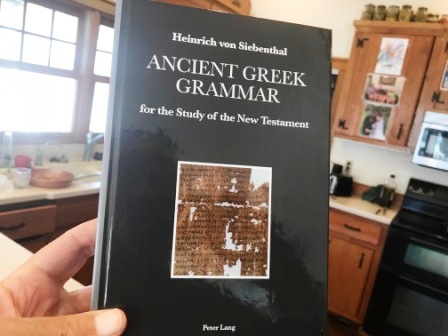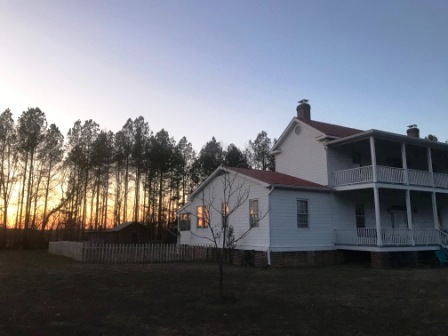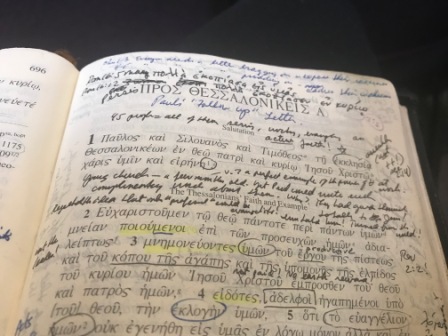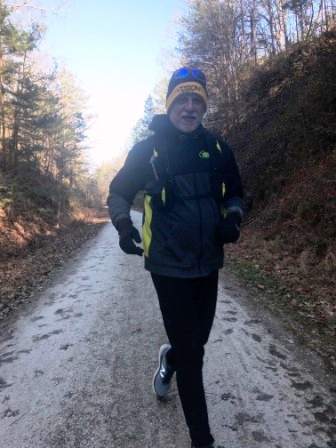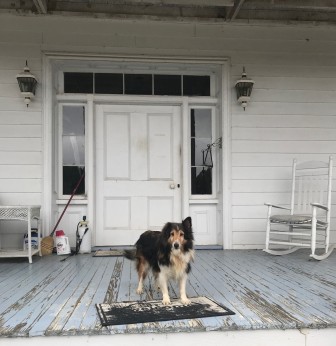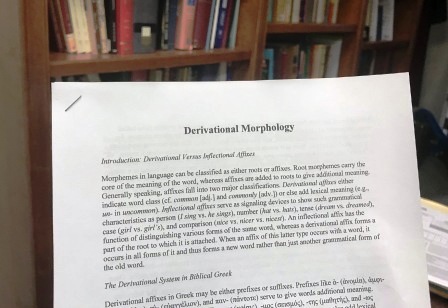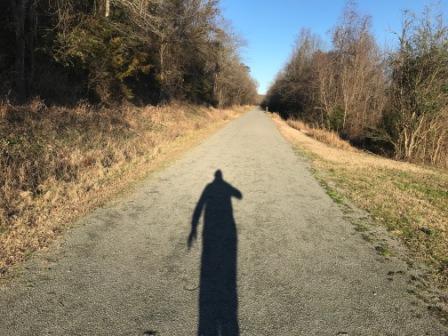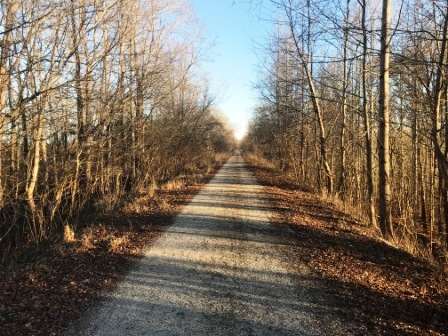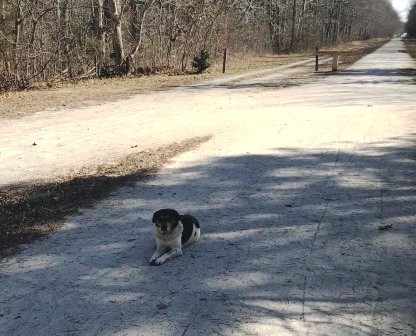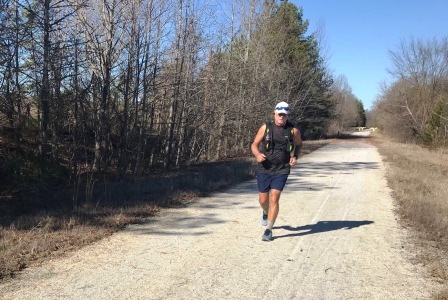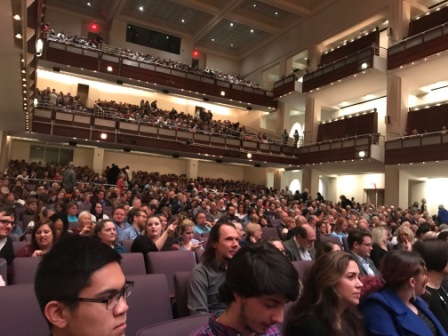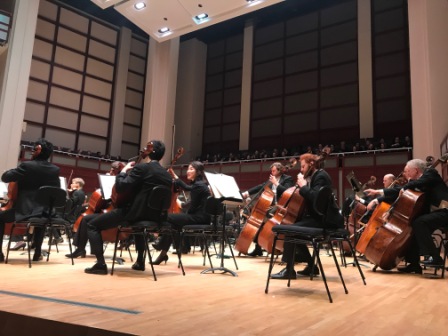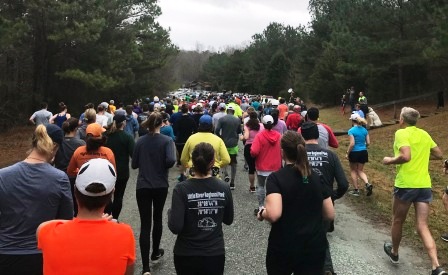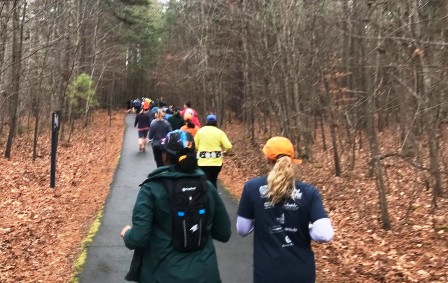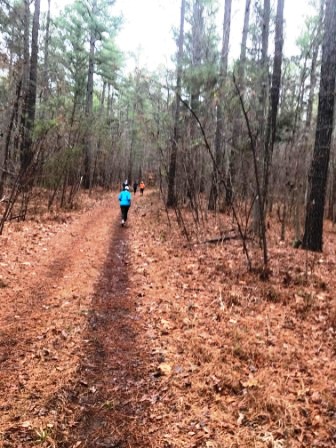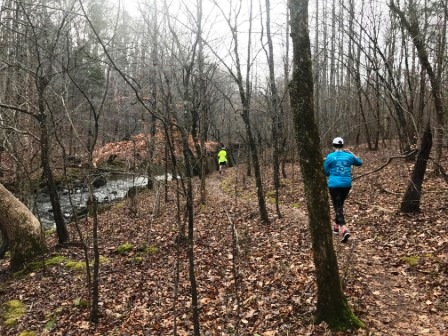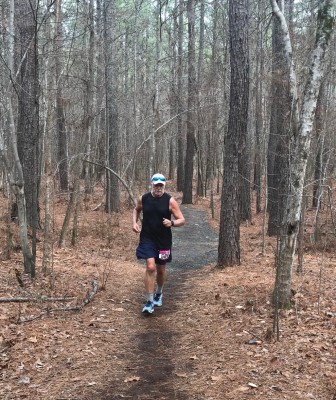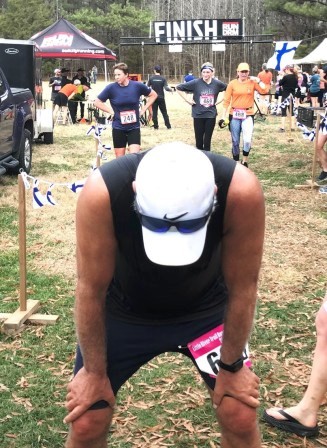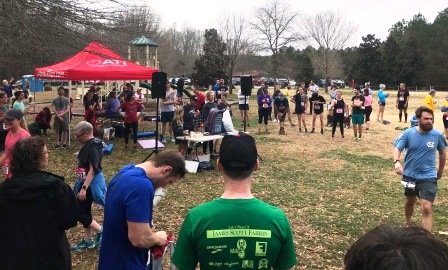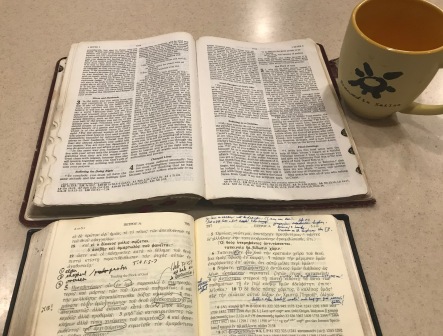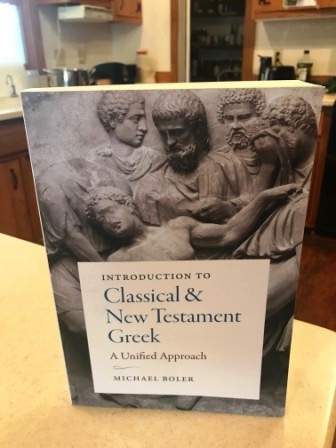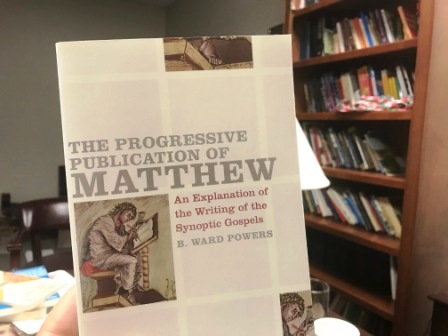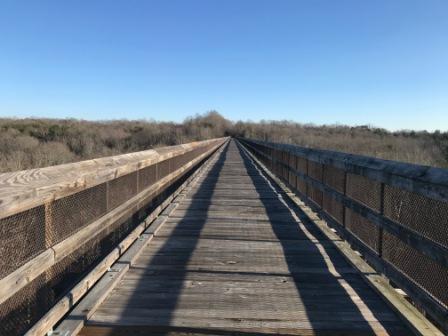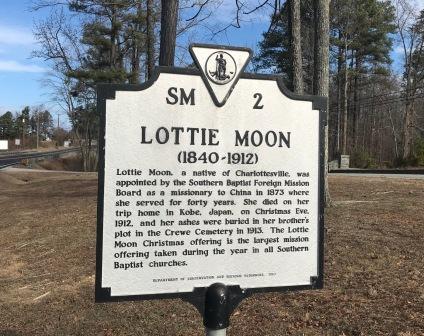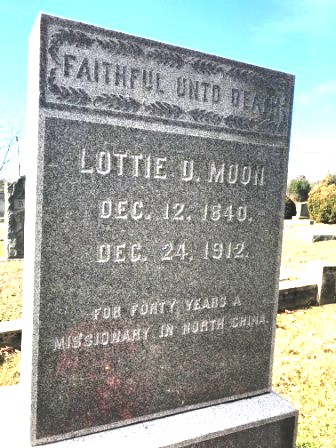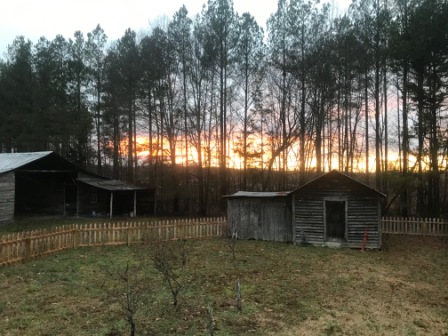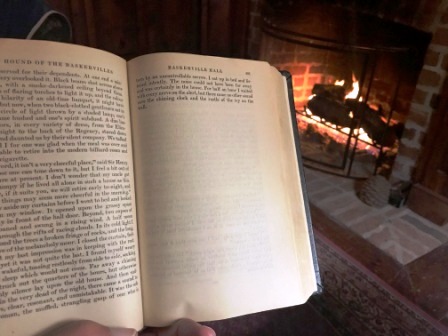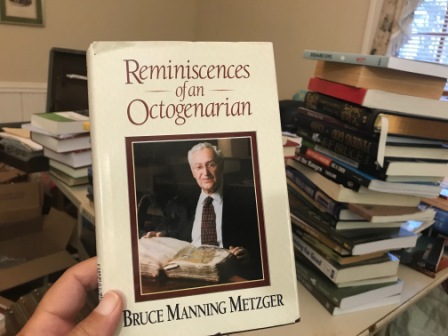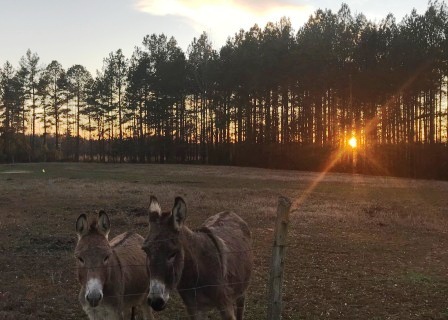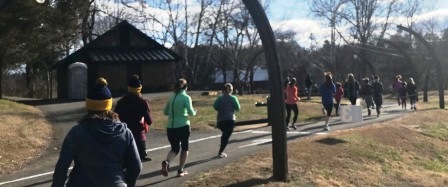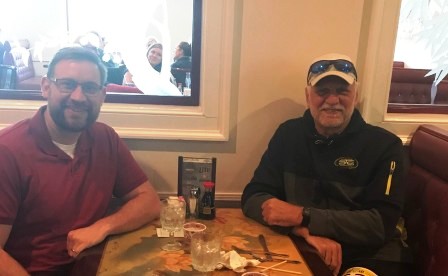October-June 2017 Blog Archives
|
|
|
||||||||
|
January 2020 Blog Archives Friday, January 31 12:30 PM Another training run is in the books. I just run by feel and aim for a low heart rate. Concentrating on staying at a slow and steady pace. Let the body roll as it naturally needs and does! P. S. Liberty University is offering a challenging mountain trail run tomorrow near Lynchburg. It's called the Arctic 5K and I can attest to the fact it's usually a very cold race. It's quite an iconic local race. I'll probably try it again if the weather cooperates and we don't get too much rain tonight. 7:15 AM The camera work in 1917 is absolutely brilliant, as you well know if you've seen the movie. Sam Mendes, who directed the film, was once asked if he thought that audiences were sophisticated enough to pick up on the genius of the behind-the-scenes camera work. His response was that he hoped people would pay more attention to the story line than to the movie's brilliant cinematography. He said, "I don't want the camera to be the most interesting thing in the movie." I don't know about you, but when I watched 1917 on the big screen I found myself focusing almost exclusively on the camera operators, at least for the first 10 or 15 minutes of the movie.
Eventually, however, I forgot about them and watched the story, oblivious to the work of the cinematographers. In other words, a camera is not designed to draw attention to itself. In the words of director Mendes, "I don't want people to think of the 'how' but the 'why' of the movie." Getting 1917 to look like one single shot took the highest level of planning and some awfully clever shooting and editing. But the film is not about filming. It's about a putting the audience in the shoes of a British soldier fighting in WW I. Years ago I became enamored with the literary artistry of the New Testament. I had been trained in the standard historical-grammatical method of exegesis and so was quite shocked to discover that the New Testament contains all kinds of fascinating rhetorical devices. It was, in fact, a jaw-dropping experience. The danger, of course, is that we begin to read the Bible only as an esthetic text and not as a theological document. The Bible then becomes merely literature and not sacred Scripture. As I have written elsewhere, I believe that too many people study the New Testament as either a great work of literature or as a textbook on theology. Is this a valid dichotomy? Not in my mind. I would claim that studying the New Testament as literature helps us better understand those ultimate concerns with which it deals. As such, it is best studied not merely as a collection of complex literary devices (chiasmus, inclusio, word play, etc.), as so many studies seem to do, but as the means by which God inscripturated divine truth. Just as the cinematography in the movie 1917 contributed to the message of the film, so the purpose of highlighting literary devices in the New Testament writings is not to impress people with its esthetic qualities but rather to see how they function to advance the message of the Bible. The Bible is indeed great literature, but it is so much more than that. The literary method has both strengths and limitations, and it's probably a good idea to keep both in mind constantly. Thursday, January 30 12:44 PM An easy 5 miles today.
We keep running, we just keep running, folks. 8:12 AM Time to hit the gym and the trail. Onward and upward in this marathon training block! 7:44 AM Read Oh, the Beauty of Scripture! 7:36 AM Just heard that we have 65 signed up for our beginning Greek class that starts on February 9. I hope you will consider joining us. There's plenty of room for you! Having been involved in graduate biblical education for the past 44 years, I've noticed many improvements. No longer is the seminary classroom the only place where theological education can take place. No longer are degrees offered only on campus. No longer is Greek inaccessible to online students. It's a joy to me to see new platforms for learning being developed in local churches. At Clearview in Henderson, both good biblical teaching and competent apologetics are taking place in a local church setting. What fun it is to mobilize believers for the cause of the gospel! None of us outgrows our need for furthering our education, whether formally or informally. Radical reform of theological education is one of the most urgent tasks of the church if we are to regain our relevance in this century. 7:20 AM FedEx also delivered this yesterday.
I especially enjoyed Dana Harris's chapter on "The Study of the Greek Language." Here she covers verbal aspect, the perfect indicative, the historical present, discourse analysis, and deponency. As Ben Merkle and I document in our forthcoming Linguistics and New Testament Greek (Baker), we are living in a fascinating time as New Testament students. A massive revolution is taking place in several areas of Greek studies. You and I are living through this massive change, and if you're anything like me, you're struggling to understand it more fully so that we can interpret the New Testament more effectively. I have every confidence that scholars like Dana Harris (whose beginning grammar will be released this year by Zondervan) are going to rip away the masks from some of our basic assumptions. We all have to find our own way through the maze, but at least we have each other to lean on. Wednesday, January 29 8:30 PM Pleasant breakfast yesterday with my assistant who just announced his engagement. Congratulations to you both!
8:12 PM Hope to spend the weekend working on the next chapter in my book about the kingdom (Godworld: Enter at Your Own Risk). This chapter deals with the simple/house church idea. I'm not all that familiar with this movement, so these books should be of great help.
6:55 PM Basic rules of hermeneutics in today's NT class, including a study of the 3 stories in Luke 15. I do hope these exegetical tips come in handy as you chase down your own exegetical goals. Meanwhile, in my Greek 2 classes we pushed ahead into chapter 14, on our way to the finish line of our 26-chapter Greek marathon. Onward we go! One of my 3 classes. Stalwart students all!
Monday, January 27 6:44 AM Out the door and off to school. Ready to make the most of my 44th year of teaching. I'm ready to get back to hard work. I have some big personal and professional goals for 2020. I will line up and chase after them with everything I have. It's just going to take daily commitment. My ultimate desire is to be content in every situation. God doesn't promise me a floodlight to illuminate the entire road. He promises a lamp for my feet. So I'm going to be thankful for what I have. In every situation. Abounding or abased. Up or down. Well fed or hungry. In plenty or in want. In good health or in bad health. Have a great week y'all. Sunday, January 26 3:34 PM Nice afternoon to clean the kitchen, sweep the floors, and take the dog for a long walk. Did I mention there's a new kid in town?
So much to be thankful for on a Sunday before the new semester kicks off. P.S. "Greek for Everyone" starts in just two weeks from tonight at Clearview Church. I hope you will consider joining us. 6:48 AM More from von Siebenthal on verbal aspect (p. 317). Here he includes a section called "Important points relevant to text interpretation." There are three of them:
These points have been confirmed by, among others, the recent scholarship of my colleague Ben Merkle (see, e.g., his essay "The Abused Aspect: Neglecting the Influence of a Verb's Lexical Meaning on Tense-Form Choice," BBR 26 [2016] 57-74). Once again, nothing much new here. And that's perhaps a good thing. No need to pursue novelty for the sake of novelty. I hope everyone can see, however, just how careful the author is with his summaries and how committed he is to the exegetical task. 5:52 AM Oh my. The Pipeline is perfect! And yes, I once broke a board there.
5:42 AM So, does von Siebenthal "lay aside" deponency? It's hard to say. The matter is only discussed in the fine print on p. 89. A summary:
That's basically it, though I also checked out his discussion of the middle voice on pp. 300-302. For von Siebenthal, the middle voice indicates "greater subject-affectedness." But nothing more is said about deponency per se. For what it's worth, in the final chapter of my grammar I summarize the voices as follows:
5:12 AM Just added the English version of von Siebenthal to my power point on Verbal Aspect. If there's another grammar you'd like included, let me know. Thus far we have:
Eventually I will be able to add the beginning grammars by Merkle/Plummer (B & H) and Harris (Zondervan). Saturday, January 25 7:26 PM Consider how Paul describes Epaphroditus in Phil. 2:25:
Paul loved the "rule of three," as did the New Testament writers in general. There was a lost sheep, a lost coin, a lost son. There were three temptations in the desert. There were three denials of Peter. We have Father, Son, and Holy Spirit. In the culture at large, triads weren't unknown either. "I came, I saw, I conquered." The following facts seem involved in Paul's threefold way of describing the Philippians' messenger named Epaphroditus: 1) In the first place, Epaphroditus was Paul's fellow Christian. He shared the same life, as do siblings from the same womb. Christians call themselves "brothers" and "sisters." Both terms could loosely be translated as "fellow believers." When envy and strife tear at family harmony (as was happening in Philippi), it would do us good to remember that we are all brothers and sisters in Christ. As such, we encourage one another (1 Thess. 5:11), love one another (John 13:34), pray for one another (James 5:16), speak truth to one another in love (Eph. 4:25), sacrifice our very lives for one another (John 15:13), forgive one another (Col. 3:13), and put one another first (Phil. 2:3). 2) In the second place, Epaphroditus was Paul's fellow worker. Not only did he share life with Paul, he shared the work. Our walk should square with our talk. If we do not help and serve one another, how can we truly call ourselves brothers and sisters? Some Christians come perilously close to adopting such an attitude. But it's not enough to say, "Go in peace. Be warm and well fed." If we don't actually meet the physical needs of others, "What good is that?" asks James (James 2:16). Epaphroditus not only talked the talk, he walked the walk. 3) Finally, Epaphroditus was Paul's fellow soldier. As Christians we are not called to instant success and glory. We live between the ages. Thus we are heirs to all the frailties and fallennness of this age. The dying of the Lord Jesus is reflected in individual suffering if not also in corporate suffering. I know. I've been there. I have seen this wretched persecution up close and personal in Asia, the Middle East, and Africa. If a church cannot endure hardship, it has no divine right to exist. "A worker must needs be a warrior...," writes Hendricksen in his outstanding commentary on Philippians (p. 139). Epaphroditus was glad to make any sacrifice necessary for the sake of others. Am I?
Beloved, we are fellow Christians who share the same God-given life. Praise be to God. But how many of us share the work -- and the danger? As brothers and sisters in Christ, may we give ourselves to the work of the Gospel as never before, and, yes, be willing to share whatever dangers come our way in our service to the Master, who gave His all for us. 12:54 PM Just back from feeding the animals. I see we have a new baby goat. How sweet! Before that I did an easy 5 mile run at the trail. Tomorrow, weather permitting and Lord willing, I hope to get in my weekly long run in Farmville, though probably not as long as last week's 26.2 mile training run. Earlier I worked out at the Y, which ended up giving me two workouts for the day.
Got my eyes squarely fixed on my June marathon! In addition, I'm working on a new power point for my NT 1 class on "The Church According to the NT." A foundational verse is Rom. 12:5: "We are one body in union with Christ," and "We are all joined to each other as different parts of one body."
I already have several pages of detailed notes. Here are a few preliminary thoughts on the subject:
Much, much more, of course, to say. Hope to have this up and running next week. In the meantime, back to reviewing von Siebenthal, both for my blog and as a review article for a major New Testament journal. 7:15 AM You guys, here's another reason why you absolutely must get a copy of Heinrich von Siebenthal's new grammar. You wouldn't even know this section of the book existed unless you looked very hard for it. But it is most certainly there. I'm referring to pages 551-567. This section is a home run. It skims the fat from the stock, removes the meat, then shreds it into bite-sized chunks. Keep simmering until you're ready to serve. The topic, you ask? Stylistic devices in Koine Greek. Also known as "rhetorical devices." Or you can refer to them by their umbrella term, "figures of speech." These I discuss in some detail in my little primer on linguistics and in this Power Point. But no one can arrange things like Herr Professor von Siebenthal can. Here's a rough sketch: 1) Figures involving word or clause order. Here we find anastrophe, prolepsis, hyperbaton, parenthesis, and anacoluthon. 2) Figures involving omissions. Included here are ellipsis, zeugma, asyndesis, and aposiopesis. 3) Figures involving repetition and amplification. Think of alliteration, homoiokatarkton, homoioteleuton, paronomasia, figura etymologica, wordplay, leitmotif, germination, anaphora, epiphora, ploce, symploce, inclusio, synonymy, hendiadys, pleonasm, parallelism, and chiasmus. 4) Tropes. The following are discussed: metaphor, allegory, simile, pictorial saying, metonymy, synecdoche, metalepsis, hyperbole, enallage, personification, symbol, ideogram, catachresis, and expanded metaphor. 5) Figures involving paraphrasing, veiling, and unveiling. The author mentions antonomasia (including the "divine passive"), kenning, euphemism, dysphemism, amphibole, litotes, irony, sarcasm, and paradox. There you have it. Is all this stuff necessary in order to do careful exegesis? Yep. For one thing, figures of speech reveal the limitless plasticity of language itself. You and I can use language to accomplish practically anything we want. The figures of speech in Koine Greek help us see how the New Testament writers wanted us to understand their message. In addition, you will notice that most of the terms used here are ancient. A couple of thousand years ago, there was logic, and there was rhetoric. How something was said was often considered to be as important as what was said. Hence we have these figures of speech. Some of these devices are rare birds, only glimpsed occasionally in the writings of the New Testament. And yet maybe we miss many of them because we read through the text too quickly. If you'd like to bore yourself for about 15 minutes, you can examine one of my published essays on this or that New Testament text that reveals some pretty amazing rhetorical devices (a good place to start might be Literary Artistry in the Epistle to the Hebrews or The Pauline Love Command: Structure, Style, and Ethics in Rom. 12:9-21). As I said, von Siebenthal's new Koine grammar is likely to become the standard go-to reference for years to come. I imagine those who are tasked with it in a doctoral program will want to burn it as soon as they have graduated. And I guess many others would consider this a dry subject or part of an outdated scholastic curriculum. Maybe I'm just a linguistic masochist, but I think you'll be making a very serious mistake if you overlook this invaluable resource. An exegete should be aware of the tools in their toolbox. And know how to use them. Believe me, it's a pleasure to encounter figurative language in the Greek New Testament. If you're looking for a short introduction to these figures of speech, look no further. The author is unpretentious and lays down no grand claims, but gives a splendid overview of the rhetoric of the New Testament. Methinks it's well worth the money, time, and shelf space. Friday, January 24 8:20 PM Richard Halverson (chaplain to the U.S. Senate):
9:10 AM Been reading through von Siebenthal's grammar. The work and effort that have gone into this book are amazing. It's less than half the size of Robertson's' "Big Grammar" but covers the same ground much more efficiently. That said, no one (including myself) is likely to read it word for word in its entirety. The book is designed as a reference grammar and should be used that way. Still, certain sections will draw you in. Of the book's 4 parts -- (1) Writing System and Phonology, (2) Structure of Words -- Morphology, (3) Syntax, and (4) Textgrammar -- the latter is an exhaustive resource for anyone wanting to become familiar with discourse analysis/textlinguistics in New Testament studies. I simply can't put the book down in this section. The content is laid out in such a way as to make for easy reading, and the author provides a plethora of examples. In short, while much of the first 3 parts of the book repeat what other Greek reference grammars have done, the section on textgrammar is quite unique. The book's Scripture and Subject Indexes are indispensable. I used both this morning to check out what the author had to say about the "Go" (Ben Merkle) versus "Going" (Stan Porter) debate in the Gospel Commission of Matt. 28:19. The result was a bit less helpful than what I had hoped for. The Greek Index for poreuomai had nothing that pertained to my quest. The Scripture Index for Matt. 28:19 listed only two pages (196, 480), neither of which dealt with the participle poreuthentes. (The subject matter in both places had to do with uses of the adjective pas.) So I looked up "participle of attendant circumstance." Nothing. Then I tried "adverbial participle" (pages 386-399). But there was nothing here about Matt. 28:19. I decided to keep on reading and was finally rewarded for my efforts. On page 407 the author speaks about what he calls the "graphic" participle.
What follows are several NT examples, including this very helpful one:
Here the Greek has the aorist participle poreuthentes followed by the aorist imperative mathete. It seems, then, that von Siebenthal would agree with those who translate Matt. 28:19 as "Go, therefore, and make disciples" instead of as "Going, therefore, make disciples." At this point, perhaps the best advice I can give users of this grammar is (1) be prepared to do some extra hunting for what you're looking for, and (2) expect to find what may be unfamiliar grammatical categories to you (such as "graphic" participles). Up next: How von Siebenthal handles figures of speech. (Hint: superbly!). 7:20 AM Saw 1917 again last night. I knew it would be the last time I could watch it on the big screen and couldn't resist. What can I say? It is a superbly crafted masterpiece. The cinematography was utter perfection. The one continuous shot keeps you spellbound for the entire 2 hours. You gotta to hand it to the rigmasters -- they are the true unsung heroes of the film. The story is a simple one: Get from point A to point B. Two soldiers have to carry a message that will save the lives of 1,600 of their comrades. Simple story but one that will have you on the edge of your seat the entire time. Just when you think the soldiers are out of danger -- wham! Yet somehow their message gets though. The day is saved. An ordinary mission is completed under extraordinary circumstances. A lot like life, which has its terrifying moments for sure. No doubt the best cinematographic achievement of my lifetime. The flare shots alone are worth the price of the movie. 1917 could completely change filmmaking in my humble opinion. Thursday, January 23 12:22 PM Easy recovery run today after my marathon on Sunday.
Just digging the aerobic well, ladies and gentlemen. Today, during my run, my average heart rate was 109 bpm, well under my 125 maximum. Low heart rate training helps me live a more centered, balanced running life. I try to run at or below my aerobic threshold, and when I do, the enjoyment is amazing. I am hoping to build my mileage to about 30-40 miles a week. I just want to stay injury-free and arrive at the starting line of June's marathon fit and fresh. My goal this weekend? Another long run, weather permitting (rain is coming). 6:54 AM If you've had a year of Greek, how do you maintain and increase your vocabulary? Well, in my Greek 3 class I use Metzger's Lexical Aids, and it's a very useful tool indeed. But for me, the best way to learn vocab is by learning words in context. That's why in Greek 3 we work, not through selected portions of the Greek New Testament, but through one book of the New Testament from start to finish, in this case Paul's letter to the Philippians -- 4 fairly easy chapters but a book whose theme is off the charts great. Also, this semester (spring 2020) I will teach 1 Thessalonians for one week during spring break -- again, a great chance to learn vocabulary by studying one book of the New Testament at a time. My goal is for students to come to appreciate Greek as an enjoyable vehicle for their daily devotional Bible reading. Which New Testament book are you now reading in Greek? Do you find learning vocabulary is easier when done in context? 6:32 AM A word or two about von Siebenthal's position on verbal aspect. The pages in question are 304-317. The author argues for 3 (not 2) aspects, which he calls:
The aorist aspect is to be regarded "as the basically inconspicuous or 'unmarked' aspect; this also ties in with its use" (p. 308).
The author is aware of the trend today to call the aorist aspect "perfective" but demurs, writing in a footnote on p. 310:
Bingo! As for resultative aspect,
This is pretty cool stuff and it nicely comports with what I write in the final chapter of my own grammar:
Stay tuned for more .... 5:55 AM Whether you're 8 or 80, it's never too early or too late to start learning Greek. The benefits will begin the very first day. But where should you start? That's a question only you can answer. Some people need assistance from a classroom instructor. Others can teach themselves from a book or video series. Either way, Greek should be fun. If it's a chore, something probably isn't right. Knowing that you're doing something right and good for yourself is a reward in itself. And when Greek is fun, you will tend to be consistent rather than starting and stopping. Check out my Teaching and Learning Greek page if you'd like some tips on how to get started. Make a choice to appreciate all that life offers you every day. Living a mindful life has many meanings, but on the most basic level it means being conscious of our need for the Bible in our everyday lives. That's why it's important to learn how to study the Scriptures on our own. Meanwhile, I'll continue to offer you the tools to make this journey all that you dreamed, and much, much more. Wednesday, January 22 2:15 PM It has arrived. Preliminary thoughts soon.
In addition, both Baker and Zondervan are publishing new beginning grammars this year. You guys, this is exactly why I love Greek. We never outgrow our need for new books and approaches to the study of the language. Well done, scholarly world! 2:05 PM J-term Greek, cya! What a crazy 12 days it's been. Ever grateful for the lessons learned about how to read our Greek New Testaments. Only 13 more chapters to go, which will start next week. Excited to continue the good work of Greek instruction to eager students. Onward and upward! Tuesday, January 21 5:55 AM A good reminder from John Stott (The Living Church, p. 103):
One more reason to teach Greek to the flock! 5:45 AM Meditating this morning on these beautiful words by Henri Nouwen:
Monday, January 20 5:50 PM Sheba and I have been out enjoying the sunset. God's creation never gets boring.
3:32 PM What better way to spend a holiday than at the movie theater? I just saw 1917. You should too. It is absolutely amazing. Incredible filming and editing!
10:42 AM I've been so busy lately I've had a hard time remembering to check my monthly stats. There are 3 principles of training with the low heart rate method I'm trying to observe religiously: 1) Scale back your long runs. 2) Rest and recovery are essential. 3) Slow down and focus on your love for the sport. Here's my Map My Run data for the past 30 days.
As you can see, I've tried to incorporate rest days after my long runs. As I've often said, as you get older recovery takes longer and becomes more and more important. The goal is not just to exercise but to stay healthy and uninjured. I'm a believer in embracing aging but you have to do so wisely. I hope I can run for many, many more years. 9:12 AM I recently read that the fastest growing group of marathoners in the nation are people over 50. That's because there are so many health benefits to having an active lifestyle as we age. The flip side is that aging runners need to be extra careful about their running routine. When I started running marathons 4 years ago I pushed myself way too hard. Now my goal is to cross each finish with a big smile on my face. I simply want to enjoy and appreciate being able to run. I focus on getting enough rest, paying attention to my running form, and doing as much cross training as I can. I'm going to continue to work on getting smarter about my training. I will never be fast enough to BQ but I wouldn't trade in my running shoes for anything. I'm listening to my body and, so far, it seems to be working. Running isn't the only part of my life but it's a big part. I love it that some of my running peeps are 40 years younger than I am. Friend, the most important advice I can give you is this: LISTEN to your body. America is becoming known as a nation of gluttony and obesity. Overeating is simply not considered much of a vice these days. I have been very careless in this regard. In 2020 I've made a commitment before God to eat more fruits and veggies and drink more water throughout the day. Of course, this has to be a long-term commitment. Although I don't follow a strict diet, I try to eat clean and cook from scratch whenever I can. I no longer eat Crisco straight out of the can (kidding). I hate to admit it, but I occasionally have a fast food disaster. Giving up soda pop has been the hardest. Sorry, I have to have my coffee. Again, I think it's important to listen to your body and what it's craving. For me, it's becoming more and more important to know where my food came from and how it was grown. What do you think? How is your diet? Are you as active as you should be? Have you made resolutions this year involving lifestyle changes? 8:10 AM The Greek New Testament has architectural precision, as seen in the passage I was reading this morning.
My students get tired of me saying it but it's true. Here's 1 Thess. 1:2-5.
It contains 5 finite verbs. But only one of them (marked in blue) is an independent finite verb -- that is, it can stand on its own. Hence the "main idea" of this paragraph: "We thank God always for all of you." What follows are 3 participles (Greek loves participles!) that expand this idea: 1) The WHEN -- as we mention you in our prayers. 2) The WHAT -- for your (a) work of faith, (b) labor of love, and (c) steadfastness of hope. 3) The WHY -- because of the way our Gospel came to you (in power, the Holy Spirit, and full conviction of its truth). Here, then, is the early church in microcosm. It's a perfect example of the Spirit of God at work. The church at Thessalonica was only a few months old, yet Paul could write such complimentary words about them. Why? They had given themselves totally to Jesus! The church there had maybe 45 people -- all of them serving, working, evangelizing. In short, their faith was active. The Gospel, truly, is the world's greatest love story. A story not only told about but seen in the lives of people. The Lord has big-time plans for those who put their faith into practice, whose love makes them work so hard, and whose hope in the Lord Jesus is firm. By the way, what I did above is called colon analysis (no jokes please). It's what I teach my students in my Greek 3 classes. There is absolutely no reason to do English-style sentence diagramming when you can do this. Your teaching outline practically jumps off the page! Sunday, January 19 8:06 PM After church today I decided to try and apply my SHR/LSD (Slow Heart Rate/Long Slow Distance) running philosophy at the High Bridge Trail in Farmville.
My goal was to do a long run in honor of my daughter who is currently in South Asia on a mission trip with her church in Alabama. I figured if she could live for a week in difficult circumstances, maybe I could run 26.2 miles as a way of showing my support for her. I'm not fast or very athletic, but I possess a spirit of gratitude for the good health God has given me that enables me to go the distance. My slowest marathon time in history, but it wasn't speed I was after.
I called today's run a "prayer run" because I spent most of the time praying for my daughter, her husband who's keeping their five kids and "holding the rope," and the 30 church members who are doing house to house evangelism all week. They have divided themselves into 5 teams. The goal of each team is to visit 30 homes each day. Now that's ambitious! Helen Keller once said, "Life is either a daring adventure or nothing." I have become a big fan of pursuing audacious goals, whether that be on the trail or in a faraway country. As I said, I was slow today, but that was intentional on my part. But finish time doesn't matter anyway. I am happy. I had run for an amazing cause and for a girl who is going to make memories for a lifetime. Glory to God! 7:12 AM Good Sunday morning! I've been wide-eyed and bushy-tailed since 4:00, putting a few last-minute touches on my classes for this week as well as for my Greek class that starts at Clearview Church next month. Why teach Greek in a local church? In 1 Thess. 1:2-5, we find Paul's "method" (if you can call it that) of church planting. When the church in Antioch sent out Barnabas and Saul, it never intended their missionaries to set up a chain of institutions to be kept under the control of the sending church. Whatever churches were planted would be deeply rooted in their host countries. They would be "home grown" congregations, integrally identified with those people who would both lead and follow in those churches. As a church planter, Paul never intended to become the pastor of the work at Corinth or elsewhere. He facilitated the work of others who would be appointed by the Holy Spirit for leadership there. We make a very grave mistake, I believe, when we think that expatriates such as Timothy and Titus were the "pastors" of the churches they were involved with in Ephesus or Crete. Their ministry, as Paul's personal representatives, was the selection and training of local responsible brothers to lead the work. In Antioch, Barnabas and Saul worked side by side in discipling the church in the ways of Jesus. Little wonder the church at Antioch, once it had been well established in the teachings of Jesus, had a burden for the nations. Barnabas and Saul went on to be commissioned by the church for the work of church planting. Within 10 years, Paul had gone on to plant churches in the Roman provinces of Galatia, Asia, Macedonia, and Achaia. In all of these places, the perpetuation of the Gospel ministry was predicated upon members of the local congregations becoming leaders of the churches among them. Ministry training was accomplished through local training, not by sending church leaders away from their homes and communities. John Frame ("Proposals for a New North American Model," Missions and Theological Education in World Perspective, p. 377) proposes a "Christian Community where teachers, ministerial candidates and their families live together, eat together, work together" (p. 379). Today, forms of distance learning include seminars, guided self-study, internet chat rooms, Skype, and interactive video links via satellite to widely dispersed students, allowing them to study without interrupting and disrupting their customary lifestyle. Praise be to God, my own Greek DVD series is being used all over the world to provide instruction in beginning Greek to pastors who otherwise would have no access to such training. Discipleship thus takes place in a living local church context. It is people-related rather than textbook- or professor-related. When the church in Acts became centralized in Jerusalem, God scattered it through persecution. Without decentralization, the church could not reach its maximum potential as a witnessing community. But scattered, the church preached wherever it went, carrying out the Great Commission. Within these scattered congregations, God provided leaders directly. In Acts we read, "Paul and Barnabas appointed elders for them in each church and, with prayer and fasting, committed them to the Lord, in whom they had put their trust" (Acts 14:23-24). Nationalization is an act of trust: trust in God to further His church on earth according to biblical principles, and trust in believers to whom the leadership of these local churches is to be entrusted. By insisting on control (or leadership) of national institutions, as some missionary organizations seem to do today, expat missionaries belie their professed commitment to servanthood. The apostle Paul pioneered the local ministry model. It deserves emulating today. Wherever I travel, my goal is to come alongside the national churches, both leaders and led, and assist them to the best of my abilities. My approach is intentionally cooperative. I seek to take no leadership role. I am there to serve, not to be served. It is this true "partnership in the Gospel" (Phil. 1:5) that makes missionary service so rewarding for me. Saturday, January 18 5:40 PM Recently I had lunch in town at a restaurant that Becky and I often frequented. It holds many happy memories for me. When I go there, everything looks, sounds, and feels the same. Even the food hasn't changed much in 6 years (though the owners are new). However, when I was there the other day I had the sense that everything was, in fact, new. I wasn't just retracing the same old steps I walked hundreds of times when I covered the same ground with Bec. The things I've experienced in the past 6 years -- all the good and the not so good -- are experiences that combine to change the way I interact with my environment. The old and familiar is now new and unfamiliar ground. The dissonance we feel between the past and the present is inevitable and even healthy. It's been said that spouses never die. They live on in our psyche forever. I don't suppose I will ever think of this restaurant as anything other than the place where Becky and I spent so many happy hours together deep in conversation. But it will also be a reminder to me -- like so many other places I visit in town -- that we Christians face a fallen world in all of its loathsome, wicked power and have to submit to a painful process of dismantling the old ways. When we face loss, God wants to invade our hearts at a level deeper than our pain. Remember: We are not the point. Despite the challenging times of life, our goal remains spiritual maturity and Christlikeness. Our focus is drawn more and more to Him. And slowly we begin to change from the inside out. I sometimes wonder if trust -- trust toward God, trust toward others -- becomes more authentic when it grows out of brokenness. Since Becky died I have never felt more vulnerable or powerless. But my loss joined brokenness and trust together. The final word is more than life on this planet. It includes life in heaven as well, where Becky and all the blood-bought saints will be. Life on this planet is not the end. Meanwhile, on this earth we experience the joy of watching others made happy and fulfilled in Christ. We receive the enrichment of their relationships with us. We may even be rewarded with seeing souls saved. This is becoming wise: Jesus as the framework, Scripture as the foundation, and growth and service as the goal. These things together determine our world-and-life view. I'll probably revisit that quaint old restaurant before too long. I do enjoy its food and ambience. Will I just be retracing old steps? I don't think so. I've come to embrace the truth that life is not a series of linear steps. No, life is full of twists and turns that keep prodding us on toward the finish line.
4:56 PM Sheba, guardian of the old home place :-)
9:34 AM Today is as good as any to tell you about the email I received this week from India. For many years Becky and I have supported the Peniel Gospel Team's efforts to evangelize northern India along the Sikkim, Nepal, and Bangladesh borders. Brother Mammen Joseph reports that a very successful VBS program was just concluded in 3 different villages with an average of 220 children present in each location.
The majority were non-Christians and the seed of the Gospel was sown in their hearts.
The older I get, the more I enjoy supporting such ministries. Missions is noble, necessary work. May we all come alongside the church worldwide and simply ask "How can we help?" as we partner with local missionaries, leaders, and organizations that are vested in their town or country. For more, see How We Do Missions. 8:55 AM Reading an interesting commentary on Matthew this morning. The author insists that Mark came before Mathew, who also used Q. Though he does mention Chapman, Farmer, and Butler, all of whom argued for Matthean priority, "hardly anybody else is persuaded." Later he writes, "This is not the place to mount a detailed defence [sic] of the priority of Mark: suffice it to say that only a tiny handful of scholars doubt it." I'll be challenging this consensus in my NT 1 class starting in two weeks. But not without first giving my students the arguments in support of the other leading views. My responsibility, I feel, is to give the class the major options and then let them decide for themselves. Here is the truth: some things in life are complicated. Do you know how often I've made decisions about this or that simply on the basis of what others think? That's the irony of it. We think of ourselves as living self-assured lives while we often slink around in group think. What keeps you from studying a subject on your own? Show up. Do your own work. Listen to others. Then go with the strongest evidence, not the number of scholars holding to your position. P.S. Here are the major views on the relationships of the Synoptic Gospels. 7:12 AM It's official. Kenenisa Bekele of Ethiopia and Eliud Kipchoge of Kenya will both run in this year's London Marathon on April 26. It's already being called the match race of the century. Their records are so close it would take a DNA test to differentiate them. Bekele has a marathon PR of 2:01:41. Kipchoge's is 2:01:39. Here's hoping for good health for both runners.
But here's the deal. Both superstars are nearing the end of their careers. They are both in the later stages of their physical prowess. The lessons for me? Dave, don't let getting older stop you from pursuing your spiritual, personal, academic, and professional goals. My message to you? Run your race. Continue to chase the dream that's in your heart. God made you good at something for a reason. You've been given gifts by the best Giver of all, so use them. Make us proud of you, even as you age. Don't wait for the timing to be just right. That will never happen. Do the best with what you've got and be willing to start off on shaky legs if necessary. I don't like it when people minimize their gifts and opportunities. "I could never learn Greek. I could never go to Oxford. I could never ...." Look at yourself. What are you good at? What gets your pulse going? Think of being a part of the piano keyboard of life. Play your note. Bekele and Kipchoge. Two men gifted with running DNA. Two men giving it their all. Two men telling us, "Don't bury your gifts!" Friday, January 17 6:06 PM Two weeks of Greek down, only two days next week to go! Students, keep up the excellent work. Your work ethic is amazing. Patience, my friends ... it works. Once you start seeing some improvements in your skills and abilities, it is very motivating to keep doing what you're doing. Patience and consistency is the absolute key for this work. Once you leave your ego at the door, you can turn your frustrations into a mental challenge for you to take on. My own week was enjoyably busy. The goats were getting out so I had to do some fence mending on the farm, but I was able to finish an essay for an encyclopedia.
I also managed two workouts at the Y in Wake Forest as well as a 6 mile run at a local park there.
I got back home today pretty well smashed after a busy week of work but instead of resting I went for a 5 mile run at the local trail and took the time to enjoy every step.
This weekend I hope to run between 13 and 20 miles with the overall goal of averaging 30 miles of running each week (= 120 miles each month). It's important, when training for a marathon, to maintain your distance base, so you can't totally back off on your LSD (Long Slow Distance) runs. It seems I have gotten to the point where I can comfortably run at least 3 days per week. My workouts are beginning to feel like a ritual that I perform with regularity and consistency.
My body tells me when it wants to go out for a run and my mind seems ever more willing to listen. As my running stride falls more and more into a groove, I seem to relax even more to the point where my training pace feels easy and sustainable. I plan to keep training at a comfortable aerobic pace. My ultimate goal is to be able to run with a perceived rate of exertion that stays within a narrow range no matter what speed I'm running. What a joy it is to discover new and better ways to economize my motion and increase my joy in running!
So there you have it. Lots more to come this weekend I hope. Monday, January 13 6:10 AM Week 2 of J-term Greek! What should I talk about this morning? Cue the opening lines of Tolstoy's Anna Karenina:
You can say basically the same thing about Greek learners. Each of us has our strengths (that make us happy). And each of us has our own personal weaknesses (that leave us a bit on the frustrated side). Is there one, universal trait that a student needs in order to grasp the Greek of the New Testament? Probably not. But in my own experience, I've found there are three skills that I personally have needed in order to make any kind of significant progress. 1) Time management skills. 2) A disciplined life. 3) Language aptitude. I've been terrible at all three. 1) Hawai'i has no time, remember? It's all Shaka and "Hang loose bruddah!" Time managements skills? Are you kidding? 2) I grew up as a very undisciplined person. Unless surfing was involved. Then I could make plans like you couldn't believe. But when it came time to study, I was like, "Surf's too good today for that." 3) I wish I had some language aptitude. Even a little. Alas, languages have always come hard for me. These three disastrous forces combined in my life just like the Allegheny, Monongahela, and Ohio Rivers merge together to form Pittsburgh. I think perhaps the best way to handle Greek is to approach your textbook like you would a complex recipe. Scan it all the way through to get the big picture, then start with chapter 1 and follow the chapters in order. The information contained therein is cumulative and progressive. This week, for example, we need to cover chapters 7-11. Do-able? Yet bet, as long as we go one lesson at a time and proceed methodically. Don't get hung up on perfection before moving to the next lesson. Mastery is enough. Most importantly, always remember that you are on the path of something BIG. Your greatest reward will be a lifetime of joyful study of one of the world's greatest books, the Greek New Testament. As for my running schedule this week.... We'll see. It's raining cats and dogs right now and the skies won't be clearing for several days, and you know how I feel about dreadmills. Happy Monday! Sunday, January 12 7:48 PM Let's face it. I'm a goal setter, and I'm sure you are too. So, when I prayed about where to run today and how far, I decided I would try the impossible. My goal today? Run 20 miles without walking. That's right. 20 miles without a single step of walking. This is something you slowly build up to folks. I remember when I could finally run a 5K without stopping. I was in hog heaven. Then I could run a 10K. Then 10 miles. Then a half marathon, consisting of 13.1 miles sans marcher. But that was it. Was I done? Someone has said, "Goals that aren't frightening aren't worth having." Truth be told, my goal someday is to be able to run all 26.2 miles of a marathon without bonking (as I usually do) at around mile 18. So there was no getting around it. The day was simply too beautiful to pass up this chance to dream the impossible dream.
And so it was. After church, I, a modern day Cervantes, drove to the High Bridge Trail to see if I could accomplish the impossible dream. Did I succeed? I knew going into this that I needed to do at least three things if I had any chance of pulling it off. 1) I would need to maintain a low heart rate. You know, focus on body fat for fuel instead just on carbohydrates (glucose). And save your strength for the finish. 2) I would have to relax. No need to expend energy on stresses I can't do anything about anyway. 3) I would have to listen to my body. No ear buds today. Just "body sensing" the whole way. I almost didn't get my little experiment off the ground. Seems the "dog patrol" was out in force today.
Dog: What are you doing on MY trail? Me: Just thought I'd go for a little run if that's okay. Dog: Well, maybe just this once. Next time you'd better ask! I could go on and on but I know what you're waiting for. Yes, I did succeed, all glory to God!
I am, I have to admit, a bit giddy about this.
Maybe the "train slow, race fast" (at a low heart rate) philosophy has something to it after all.
We'll see come marathon day in July. But for now, all I need to do is keep training, keep improving, and keep ignoring the logic of this ridiculous thesis. Keep your ize on the prize, Dave 6:55 AM The Meymandi Concert Hall in Raleigh was packed to the gills last night for a performance of Gustav Holst's symphonic blockbuster The Planets.
My favorite planet? Definitely Mars. Think early Star Wars music.
This music will never be forgotten as the years pass. By the way, Holst left out Pluto in his masterpiece. The planet hadn't been discovered yet. Maybe he knew something we didn't, as today Pluto is no longer considered a planet but merely a "dwarf planet"! Saturday, January 11 1:40 PM Greatly convicted this afternoon by what Paul writes in 1 Thess. 5:12-13:
The formula is: Sincere appreciation + sincere affection = happy congregation. No more nit-picking with our pastors, folks. Quit being so critical. So what if he preaches too long. So what if he's boring on occasion. So what if his illustrations miss the mark (in our "humble" opinion, of course). So what if he speaks in a monotone. It takes only one negative comment to overcome about 100 positive ones. At least that's what it feels like if you are a public speaker. Tomorrow, after the service, and for the rest of 2020, I'm going to make it a point to tell the speaker I sincerely appreciated his message, and mean it. No more off the cuff suggestions under the guise of "constructive criticism." He has poured his soul into his work. He deserves, says Paul, not just esteem but the "highest possible esteem" (the Greek huperekperissou is a very strong term). I'm not talking about flattering or fawning over our leaders. Nor am I saying that negative feedback isn't important. But it has its place and its time. Leaders in the Lord's work are not meant to be lightening rods for criticism. God Most High, have mercy on me. I am the greatest sinner in this regard. I want to do better. I need to do better. 12:24 PM Pictures tell a story way better than my writing. So here are a few scenes from the 7K trail run I did in Orange County, NC this morning. Here's the start of the race. Per usual, yours truly started out near the back of the pack.
Before long you're leaving the road and entering the woods.
A few minutes later and you're on a single track.
This is where the real race starts as you begin to see who you can reel in and pass.
Toward the end of the race your adrenaline begins to pump and you can't help pushing your speed a little bit. This leaves you a bit on the pooped out side when you cross the finish line.
Fight the good fight, finish the race, keep the faith.
One of my favorite parts of an event: The awards ceremony. A race can unite people from every gender, race, ability level, and age group.
Did you like the pictures? If I didn't make so much money blogging I'd become a professional photographer. :-) 6:45 AM 1 Pet. 5:1-5 was part of my reading this morning. I'd like to chat with you briefly from it regarding pastoral (and, by extension, a professor's teaching) ministry.
The first word in the Greek text is "elders." These aren't merely older men. We might call them "church elders." Some today who see every member as a minister press the body analogy too far and insist that there can be no identifiable leadership in the church whatsoever. I do not espouse that extreme position. The Risen Christ has delegated pastor-teachers to the church and given them the privilege of teaching and leading the flock. Next we find "elders among you." It seems that leadership was mostly home grown in New Testament times. Paul appointed elders in every church, we read. He did not ask them to be parachuted into the communities in which they were to serve. I am hearing more and more today of churches that are raising up leadership from within. It's a practice that goes right back to the example of the earliest church. Next, Peter says two things about his earthly experience with Jesus: "I witnessed His sufferings, and I will share in the glory that will be revealed." Suffering and glory. Hold on to this balance, dear believer. Never think for a moment that your life will become any easier. Just keep taking your struggles to Jesus. And never forget that it's all a prelude to glory. "Wrestle," as someone has said, "face forward." Peter then says "I appeal to you." Pastoral care is parental care. Parents would rather appeal, tenderly and affectionately, with their children to do what is right. Of course, the fact that Peter "appeals" to us does not lessen our responsibility to do what he says. "Be shepherds of the flock that God gave you." "Be shepherds" is a metaphor for the work leaders are to do among the congregation. Shepherds don't drive, they lead. Shepherds know their sheep and call them by name. Shepherds are willing to give their lives for the sheep. (See John 10.) To local church "shepherds" has been entrusted pastoral care, including teaching and admonition, and they are expected to work hard in serving the flock. The emphasis is not on their rank or authority but on their efforts for the well-being of their charges. This is in keeping with Jesus' own teaching that leaders are to be the chief slaves. "Take care of the flock willingly and not unwillingly, as God wants you to." Happy is the church whose leaders (and whose seminary professors) exercise their ministries with eagerness and joy! "Do your work, not for mere pay, but from a real desire to serve." There is nothing wrong in being remunerated for one's service as an elder. But being financially supported is not an essential part of the calling to pastoral ministry. If God is calling you to serve as a local church elder and there is no financial support from the body, do not go around asking for support. Scripture gives a clear mandate to go and do the work. "Do not try to rule over those who have been put in your care, but be examples to the flock." The best leaders lead by example. That's because, as Jesus instructed us in Luke 6:40, Christian education is essentially likeness education. Like father, like son. Like pulpit, like pew. We become like those we follow. In the margin of my Greek New Testament at Hebrews 13, I've written these words by Tony Merida: "Leadership is not lordship. It's setting an example and inviting others to follow you." "When the Chief Shepherd appears." Peter is referring to the church's Senior Pastor. His name is Jesus Christ, and in all things (even our church titles and nomenclature) He is to have the preeminence (Col. 1:18). His appearance is sooner now than it's ever been. For all these years He's been preparing a place for us, and I imagine it's going to be quite a place. "You will receive the glorious crown that will never lose its brightness." Christian work without the hope of future reward is the worst kind of drudgery. My friends, let's not grovel in despair over our thorn in the flesh but move on to the daily anticipation of His coming. A final thought comes to mind. God may not call all His people to pastoral ministry, but He does call all His people to ministry. To quote John Stott (The Living Church, p. 74):
If I were a pastor, I imagine it would be helpful for me to reflect from time to time on 3 truths:
There's no point is saying "Every member is a minister" if the structures in our churches say the opposite. Friday, January 10 5:14 PM When I first took Greek, I lasted exactly 3 weeks. I vainly tried to keep up with what the professor was teaching me. I could, to be sure, memorize everything I needed to learn by heart, but understanding -- ah, understanding was way beyond me. I was brought to my knees when I thought I was never going to learn Greek. And somewhere in the midst of all that, God met me in my weakness. It took me by complete surprise. One minute I was despairing, and the next minute I was reveling in Greek. Tonight, as I sit in front of the fireplace, savoring the Greek class I began teaching this week, I have time to stop and reflect. All I can see is that foundation, that crazy call which 44 years ago made me forsake everything to be where I am today. And now, here I am, blogging about Greek classes and about writing essays on Greek morphology and about reading Greek grammars. Oh the wild joys of the Christian life. I can't fathom it. I can't wrap my head around God's sovereign leading of His children. I watch in amazement as I see the light go on in a student's eyes. I see the same love for Greek that I once discovered so many years ago. It is marvelous. Tonight, I rest. It is tiring to teach for 5 days straight. The weekend is a much-needed break. I keep praying for God to fill me back up again, with strength and with wisdom and especially with love, so that I can return to the classroom and pour myself out again. What if it ever gets easy? What if it ever stops being hard? What if I simply begin to coast through my classes? That's the day I'll hang up my teacher's robes and walk away from my profession. It's supposed to be hard. These are real people, with real needs, joys, challenges, dreams. They deserve only my best. I'm not one for too much introspection. But here I sit, conscious of being held in the same hands that threw the stars into space. My heart is pieced back together by a Carpenter who uses the same nails that pinned Him between heaven and earth. Yes, next week is going to be wonderful, as wonderful as this week was. We are going to meet God there, all of us, part of this awesome privilege of sitting in the front row of His kingdom work on earth. We're all excited to see how this is going to turn out. I'll keep you posted. 2:18 PM Hey folks! Welcome to this little corner of the internet. I love to blog but when you've been teaching all week you kind of go on hiatus. First off a big thanks to my assistant for getting everything ready for class so well this week. Second, a shout out to all my Greek 1 students. Hope you nail this weekend's take-home exam! Third, I did managed to get in a few training runs this week. Here's what I did yesterday, all at a very slow heart rate.
See my heart rate zones? Proud of me? I am stoked!
Fourthly, this book was on my front porch when I arrived home.
Can't wait to dig into it tonight. Never saw a Greek grammar I didn't love! Finally, been working on an encyclopedia article on Greek derivational morphemes. Need to finish that next week. Woven into all of this were two visits to the YMCA in Wake Forest. Confession: I love to work out, although the gym can be a bit annoying this time of the year when everybody seems to be exercising at the same time of day (i.e., when I'm there). Still, I'm glad to see so many new people at the Y, the products of new year's resolutions no doubt, but even if so, I give them a lot of credit. True fact: Thinking about going to the gym burns between 0 and 0 calories. What else? Thinking about doing a trail run tomorrow depending on the weather. Then I'm rereading this book in preparation for my NT 1 class.
Oh, Lord willing, I will be attending the NC Symphony tomorrow night to hear Gustav Holst's The Planets. I am a huge fan of classical music and this piece is too good to pass up. Okay, that's all I've got in the way of new experiences this week. Monday, January 6 6:05 AM Off to teach. 22 years at Biola. 22 years at SEBTS (thus far). Teaching is a lifelong process that never stops. A word to my students: At heart, I love teaching more than anything I've ever done. I am excited and happy to offer you Greek 1 in J-term. You know, the lessons of Greek translate into lessons of life. So have fun with the class. Don't worry about pace. Interact with your fellow students along the way. Make it as much about the experience as about the knowledge. Make at least one new friend in the class. It's really all about people in the end. You know, I've run hundreds of races, up to and beyond the marathon distance. But my favorite race was a 5K. That's right. A 5K. I ran it with my daughter. Please note as well: With Greek you can't cheat yourself or take shortcuts. You have to pay your dues. There are moments when you will struggle and will need to look for special help. My door is always open. Before I go, a few quotes. Said Einstein:
Said Yeats:
Said Ward:
Joy. Light. Inspiration. My motto this year as an educator? "Listen to everyone; follow no one except Jesus." Y'all have a great week. Sunday, January 5 7:34 PM Gratitude, gratitude, gratitude. Oh my, I have so much to be grateful for, such as living only an hour and 15 minutes from one of the greatest running trails in all of North America.
You even get to cross a historic railroad bridge over the famous Appomattox River.
Since tomorrow I have the awesome privilege of introducing new students to the greatest language in the world and of challenging them to pursue their mastery of Greek with unflagging zeal and determination, I decided I would challenge myself to run a half marathon in their honor at the High Bridge Trail.
I ran the whole distance, using the low heart rate method and as a result I finished the race without any tiredness or soreness whatsoever, which enabled me to clean the kitchen and prepare my meals for the week when I got home without even showering or resting up first. What a wonderful energy surges through your body when you move well. You savor the sensations. And then you take that energy with you into the next activity in your day. It's not all perfect, please. I've gotten bitten in life, lots of times, and it hurts. What I want to tell you is that I have so many undeserved blessings that I can't even count them. Just when it couldn't get any better, on my drive today I happened to pass through a town in the middle of nowhere called Crewe, where Lottie Moon, the famous Southern Baptist missionary, is buried.
"Faithful unto Death." (Little secret: I aspire to such an epitaph.)
Anyway, I had a wonderful day. I feel I did something. It felt significant yet hard to describe. It felt good and solid. Tomorrow I will go to campus to support my school, my students, and my community. I will go to find comfort with and connection in people. But I will never forget where I was today -- on a trail by myself surrounded by the beauty of my God. 8:04 AM Starting a foreign language and you're over 30? Age is just a number. "It's harder as an adult" is a myth. Yes, children and adults learn language differently. Children learn spontaneously. Adults learn more systematically. But don't let that difference deter you. Anyone, at any age, can learn a new language. All you need are the right tools, proper motivation, and a little effort. (Okay, a lot of effort, but you get my drift.) When William Adams arrived in Japan four centuries years ago, he learned Japanese. And he was considered "old" for his time (35). All astronauts going to the International Space Station have to learn Russian in case they need to communicate with their Russian counterparts. The bottom line: If you believe you're "over the hill," you probably are! P.S. Our "Greek for Everybody" class starts Sunday, February 9, at 6:00 in Henderson, NC. Attendance is free. Don't let age keep you from learning how to read New Testament Greek! 7:20 AM Starting school? Read What I Learned During My First Semester in Seminary. Saturday, January 4 5:24 PM Tonight's sunset.
1:42 PM Just back from a 30 minute swim and a 1 hour run. While at the track my mind meditated upon Acts 2. The earliest believers "met constantly to hear the apostles teach" (Acts 2:42, REB). On the Day of Pentecost, God established the first theological seminary in the world. It was called the local church. The first seminary in Jerusalem had 3,000 students. I may have 3. It doesn't matter. Followers of Jesus are always eager to learn all they can. I know I was when I was a teenager in Kailua. Despite the anti-intellectualism that characterized some of my peers, I knew that the Holy Spirit was a "Spirit of truth" and that wherever the Spirit is at work, truth matters. In those days, we Jesus Freaks got most of our formal instruction from the good people at International Baptist Church in Honolulu. They taught us a living church is always a learning church. How our hearts burned as Christ opened the Scriptures to us! Eloquent reason! Scholarship on fire! Still today my greatest thrill is to hear of local churches that are both thoughtful and passionate and that combine faith and reason. Would that every local congregation of believers was like this. All Christians are called to be truth lovers. All are called to be Bereans who dig into the word for themselves. Let, then, the church do all it can to promote learning and, through learning, obedience. 6:20 AM The word of the day is "ulterior." As in, "existing beyond what is obvious or admitted; intentionally hidden." You know, like the time you hung out at the library just to have a conversation with your crush. As I think about language, and about the books I've written on language, I've discovered what might be an ulterior motive behind practically everything I've produced. Sure, you'll find lots of information about grammar and syntax, participles and infinitives. But in the end, these books are out there to entice you to get interested in linguistics (one of my books even admits this). From a content and structure perspective, my books are designed, I suppose, as a kind of tease. I essentially "dabble" in subjects that can have (and have had) entire books written about them. If I'm guilty of surface-skimming, it's because my goal is simply to provide a foundational understanding of how language works. Language per se is a concept that, despite being frequently discussed, is rarely given the thought or time it deserves. When I began writing books about Greek some 36 years ago, I picked up every work on linguistics I could get my hands on. The value of most of those books today is about that of an ancient Greek ruin. But they are no less readable for that reason. The face of the Sphinx is disfigured, yet Rilke still managed to meditate in grateful silence before it. So too we may appreciate the work of a lost time. To that time my books will soon belong. But that's not the point. I was not writing to develop a new discipline. I was writing to develop discipline itself, a kind of discipline that makes us want to "take up and read" works about one of God's most spectacular creations, human language. When all is said and done (and written), I hope I may have ushered my readers into the very awareness animating all students of language that human speech is a truly wondrous thing in and of itself. Friday, January 3 6:18 PM Reading The Hound of the Baskervilles on a cold, windy, dark winter night. One of my favorites to this day.
5:40 PM Did another 5 mile run today using the LSD (Long Slow Distance) method and while running it occurred to me that the LSD approach to running has two main goals: to make running as efficient and enjoyable as possible, and to prevent injury. This stuff really makes sense to me. I am actually enjoying running more because it feels good! I can feel my quick cadence and light steps. Clearly, I still have a long ways to go but I'm making steady progress. I'm not a fast runner but it sure makes the sport fun and enjoyable. I see a parallel, by the way, between this method of running and the study of New Testament Greek. (You saw this coming, didn't you?) The goal of my Greek teaching is also twofold: to make learning as efficient and enjoyable as possible, and to prevent my students from making mistakes ("injuries") when they use Greek in ministry. If you're not enjoying your study of Greek, then the method you're using is backwards! And if you do learn Greek and then go out and commit one of the many exegetical fallacies we've taught you to avoid, that's on you! Just the other week I was visiting a church where the speaker both mispronounced the Greek words he used in his sermon and misinterpreted them. I'm a firm believer that Greek isn't the Abracadabra or the Open Sesame of New Testament interpretation. That said, a reading knowledge of the language can make our exegetical study all the more enjoyable and accurate. A knowledge of Greek can also be prophylactic in the sense that it will hopefully keep us from repeating the same mistakes our forebears made over and over from the pulpit (i.e., confusing word and concept, etymologizing, illegitimate totally transfer, etc.). When I first started running I told one of my kids that my goal was to "learn" how to run a 5K. They said, "Learn to run? You just do it!" Truth is, good running form just doesn't come naturally to me. It's nice to know there are resources out there to help me run more efficiently and reduce my risk of injury. Interesting stuff. We are always learning, aren't we? 9:15 AM Don't know if you're a goal setter or not. I am. I not only write down my goals, I blog about them! Of course, as soon as I write them down they disappear under a stack of books. Does that still count? Seriously, I love writing down my goals and reviewing them every day. They make me feel like I'm getting somewhere. I just added a new goal to my list yesterday: "Find a Spanish tutor and begin meeting with them next week." So if you know someone who can tutor me in Spanish who lives in the Wake Forest area, kindly let me know. Tell them I am a wonderful student and am not afraid to make mistakes (for which I am famous). In addition to writing down goals, I'm a major to-do list maker. Research shows that the writing down of goals and/or tasks makes them infinitely more likely that we will achieve them. Your goals can focus on anything: getting chores done more consistently, working out, eating better, cutting down on credit card debt, saving money, landing a new job, starting a business, reading a new book every week, traveling more, learning a language, becoming a better parent. The point is, set yourself up to be successful. Here are two more goals I recently added to my list for 2020: 1) Run at 170 strides per minute. Almost there, judging from the 5K I did yesterday at the track. I'm trying really hard not to bite off more than I can chew.
2) Maintain a lower heart rate. Looks like I might be on the right track here.
So there you have it. In the bleakness of winter I've got my eye set on the prize(s). Of course, I have to remind myself that there's more to life than watching my heart rate or strides. There will always and forever be goals I will never reach, and that's okay too. 7:55 AM Greek class starts on Monday. But can you learn to read Koine Greek on your own? Most definitely! Formal classroom instruction is not indispensable -- and I say this as a Greek teacher. Most of the languages I know I learned on own. Some I've learned quite well. Others not so well. But if the desire is there, you will learn. The bottom line: if you really want to learn Koine Greek, you will. If don't, you won't. For suggestions on learning Greek (including some excellent "living language" approaches), go here. Thursday, January 2 7:14 PM Time and again I have read 1 Cor. 13. We often hear it said that in place of the word "love" we could substitute the name of Jesus. You know: Jesus is patient. Jesus is kind. And so on. But I wonder. Maybe we should substitute our own name.
Again and again and again I have said, Forgive me, Lord. But please, oh please: do this work in me. A new year is perhaps a good opportunity to take a personal inventory to determine how much of the fruit of the Spirit is grown in our lives. Christianity is not a fish on our car or hands held high in a church building. It is love -- love for God, love for others, and even love for ourselves, a recognition that you are a unique creation of God and a person He wants to love and use despite your scars, your inadequacies, your idiosyncrasies. As Chief Physician, Jesus has diagnosed us all with a terminal illness called self. But, thanks be to God, He has established a hospital for sinners. It's high time, don't you think, that we checked ourselves in. 8:14 AM Guidance. Yes, ladies and gentlemen, that's the word of the day here at DBO. "Your word is a lamp to guide my feet and a light to guide my path" (Psa. 119:105). As Christians, we have a guidance system -- a best-selling collection of 66 books that guides our feet and illuminates our path forward. These books are collectively called the Bible, but the Bible is actually one book in two volumes, and the first volume is especially replete with testaments from men and women who trusted God completely as well as people who completely disregarded Him. The Old Testament tells it like it is, warts and all. But the overriding message is a simple one: God desires us to experience a full and rich life, and He will guide us out of whatever dark space we happen to find ourselves in, whether it's our fears of what the future holds or our tears over a broken relationship. The Bible, however, is not the only guidance system out there. As we've often said on this blog, Christian biographies can come alongside the Bible and give us example after example of how God indeed has a magnificent plan for our lives that exceeds our wildest imaginings. Bruce Metzger's memoir is a good example of this.
It takes the reader from his childhood in Amish Country to the hallowed halls of Princeton University. I was drawn to this book because in some ways the career of Bruce Metzger and my own have coincided with each other. As I began the book, I wondered to myself, "How did Metzger end up becoming a Greek teacher?" The answer is found on p. 22. It was the 1938-39 academic year. One day Metzger just "happened" to be sitting next to John MacKay, the president of Princeton Theological Seminary, during a train ride. At some point in the conversation the president asked Metzger if he would be willing assume the post of teaching fellow at the seminary while he was pursuing his doctorate at the university. He would be employed by the seminary to teach entering students the grammar of the New Testament. "Of course I gladly accepted the invitation," wrote Metzger. "In the autumn of 1938, therefore, I began the first of my forty-six years of teaching at Princeton Theological Seminary." Metzger was only 24 years old at the time. Fast forward 38 years. It was the fall of 1976. A need arose in the Greek Department at Biola for an adjunct instructor in Classical and Koine Greek. The head of the Greek Department at the time was Dr. Harry Sturz, whose impact on my life was incalculable. (I've recounted that impact here.) For some reason that mantle fell upon my shoulders. That fall I began what, thus far, has turned out to be a 44-year career of teaching. The odd thing is that neither of us sought out that opportunity. It was simply God directing our paths. Incidentally, I was 24 at the time. Where are you today, my friend, on the path of discovering God's plan for your life? When we become a Christian, the thought of being used by God to make a difference in other people's live can be paralyzing. But what we feel incapable of doing, God is able to do. He knows what school we will attend and who we will marry and how many children we will have and where we will work and when we will retire. He is with us now, and He will be with us through eternity. One of the most important lessons we can learn is that life is never stagnant. Things will constantly be changing. With that said, I think the life of Bruce Manning Metzger embodies a lot of what this blog is all about -- challenging yourself to keep moving forward no matter what and being open to whatever the Lord has in store for you. The Christian life is demanding and often frustrating, but it offers the rewards of great joy and fulfillment to those who throw themselves into it with prayer, abandonment, and love. Wednesday, January 1 5:58 PM I just took this picture -- my first sunset of the new year and a very nice symbolic turning of the page, don't you think?
Happy New Year to all of you out there and a question: are you looking forward to and/or dreaming of something big in 2020? I am, starting with a new race schedule. I just added this event to my 2020 race schedule.
That's right, a 5K on an active runway in Lynchburg. Go here to sign up if you're interested in this unique event, but be forewarned: The site just went live today and there are only 281 spots (out of 300) left the last time I checked, so you had better hurry. I've signed up ...so how about you? Earlier today I ran my first 5K of 2022.
It was a small, family-oriented event, maybe a total of 80 runners. I enjoyed it immensely. Here's the view from the middle of the pack.
It's always nice to be in a race where everything seems to fall into place. No wind. No snow. Your stride felt great. No muscle or tendon aches. So thankful! It was nice to check off a box on my bucket list for the new year. Now all I have left are AT LEAST one 10K, one 10-miler, one half marathon, one full marathon, one ultramarathon, and one triathlon. I am not contemplating measurable goals in any of these races other than finishing. The common theme just seems to be giving myself permission to say yes to the things I'm passionate about. One of those things is teaching, of course, and it was a wonderful New Year's surprise to be able to have lunch today in Lynchburg with one of my former students.
Ben took Greek with me years ago and eventually went off to the UK for his doctorate. He now teaches New Testament and Greek fulltime at Liberty. How cool is that? For me, the icing on the cake was when he invited me to speak in his NT class in February on my approach to the synoptic problem. I didn't realize this until today, but Ben actually shares my view that Matthew is our earliest Gospel. (Always nice to meet another obscurantist.) Anyway, it was great to chat with Ben and get caught up. He loves to run as well, and I'm hoping he can join me on the tarmac in April. Time to wind down for the night. Before I sign off, let me reiterate: my main goal for 2020 is to stay centered in Jesus. He's the new life that surges into our lives, shredding off the old and making room for the new. That is to say, He helps us in our Christian walk and picks us up again if we fall. When we give Christ what little we have, He multiplies it and the result is abundantly beyond all we can ask or think. Praise be to God. 6:22 AM I'm sometimes asked, "Which foreign languages are the most difficult for English speakers to learn?" Before I answer that question, a quick observation or two. First, language difficulty is always relative to a learner's native language, in my case, English. Secondly, one's ability to learn a foreign language is, I think, less a matter of one's intelligence than a matter of one's interest in the language and its culture. Becky and I met many Americans living in Basel who couldn't speak a word of German. It wasn't because they weren't smart enough to learn the language. It was because they had no friends who made it worth their time to acquire German. By way of contrast, all of our closest friends were German speakers. In fact Becky, who didn't know any German prior to her arrival in Switzerland, developed a surprisingly high level of fluency in the language within a year because she had immersed herself in the culture. As for the question of language difficulty, the U. S. Foreign Service Institute (FSI) has come up with several categories. Some websites I've seen have 5 categories, other have 4. Here I'm using the 4-tiered system. From least difficult to most difficult, these are (1) languages closely related to English (such as French or Spanish), (2) languages similar to English (such as German), (3) languages with linguistic and/or cultural differences from English (such as Greek and Hebrew), and (4) languages with significant linguistic and/or cultural differences from English (such as Arabic and Cantonese). The FSI refers to the latter as "super-hard languages." The game changer, in my opinion, is the teacher. By showing that the subject is fun, interesting, and important, language teachers can transfer their positivity to their students. My Hebrew teacher in seminary was like that. His approach to language instruction was to be simple without being simplistic. Learning Hebrew was a joy. Incidentally, I heard this joke recently. What's the most important sentence you can learn in a foreign language? It's "Where's the bathroom," right?
Nope. It's "My friend is going to pay." "Dos enchiladas, por favor. Mi amigo va pagar."
Languages are such fun. :-) Onward and upward to a new year and to new adventures on this earth! |
||||||||

